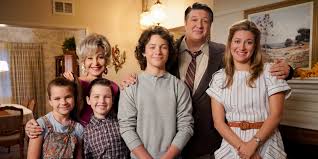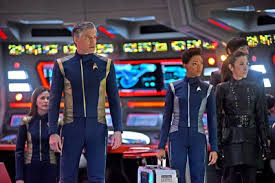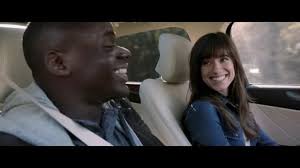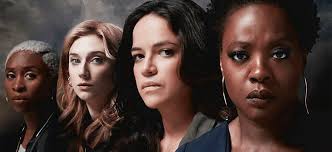As always, a couple of caveats. When I say ‘the best’, I mean the stuff I really really liked. So I’m quite comfortable with you disagreeing – if you didn’t like something I did, then probably the reverse is true, and that’s totally fine. Secondly, whilst I’ve tried to avoid spoilers in what follows, read on at your own peril if you haven’t seen the programme/film concerned.
Onwards!
Small Screen
We’ve watched crime dramas from around the world – Cardinal (Canada), Crimson Rivers, No Second Chance and Les Dames (France), Darkness (Those who Kill) and Follow the Money (Denmark), Greyzone (Denmark/Sweden), The River (Norway), Night and Day (Spain), Trapped (Iceland), The Team (Denmark/Netherlands/Germany/France), Harrow (Australia), Perception and The Sinner (USA). These are a mixed bag – not all these series are ones we will follow up if we get a chance – and you may note a significant omission. Spiral is currently airing but at the time of writing we haven’t yet watched it – it’s accumulating on the BT box and we’re saving it up as a treat once it’s complete. Those are the rules, sorry. We’re also part way through Deutschland 86 which is excellent, and so extraordinary to contemplate how the world and the mindset of the GDR were due to disintegrate so completely only three years later.
Obviously, there’s plenty of home-grown crime too. Again, they’re a mixed bag – we weren’t entirely persuaded by Cheat, The Bay, Trust Me or The Widow, although they were entertaining enough. Baptiste, Innocent and Informer all had strong plots and strong casts, and emotional heft as well. The Le Carré adaptation, The Little Drummer Girl, was excellent too.
But in their own league were:
Endeavour – this keeps on getting better. The final episode was superb, and very moving. But for my money, the writing and acting in a brief scene between Bright (Anton Lesser) and Thursday (Roger Allam) was television at its finest. They were talking about the women they loved and feared (or knew) they were losing, how they had met them – and as each of them reminisced, it was as if they were each in their own world of memory, their words interweaving in a way that was somehow operatic (whilst being very understated, as befits the two characters).
Killing Eve season 2 was widely reckoned to be not up to the first. I can see some of that. But it was still quite deranged, deliciously wicked, and wickedly delicious. Whether a third season is a good idea, I don’t know, but will give it a go – I can’t think of any other series that has delivered the utterly unexpected quite so frequently. And Jodie Comer and Sandra Oh totally deserve all of the praise they’ve received for their performances.
Line of Duty was as nail-bitingly tense as ever. The elements are familiar now but the twists and turns of the plot are still gripping, and the performances excellent. I think before the next season, whenever that lands, we will have to re-watch the whole thing from the beginning, because it’s clearly all interconnected and I’m sure all the clues as to who is H (if indeed there is an H) are there somewhere… (and no, of course it isn’t Ted. Don’t be silly).
After all that murder, we do need the occasional laugh. I’m super-critical of comedy. I’ll give a new programme a try, but if it makes me wince more than it makes me laugh it doesn’t get a second chance. These passed the test.
This year saw the last Big Bang Theory – there was a point when I thought it had exhausted the comedic possibilities of the sitch and the central (male) characters, but bringing the women into the foreground gave it a new lease of life, and the final season was funny and often touching. Young Sheldon turned out to be excellent, the Cooper family drawn and performed with real affection and warmth.
We got to Fleabag rather late in the day but it was brilliant and funny. I was starting to find the glances to camera slightly irritating, when she changed the rules again in Season 2, with the hot priest noticing and asking her about it. Weirdly, Gentleman Jack also used the same trick (no idea who was copying who).
Derry Girls was fabulous, and silly, but never let one quite forget the context. The events around the signing of the Good Friday Agreement and Bill Clinton’s visit to Derry may have been mere background as far as the teenagers were concerned, but were heavy with meaning, at a time when the GFA seemed under threat from a no-deal Brexit. (It may still be – only a fool would attempt to make predictions at present.)
And The Good Place took us into unexpected realms of moral philosophy whilst being very funny along the way. (We’ve just finished season 2.)
Of these, I’m going to pick Derry Girls as my fave. I love those girls (and boy). And Sister Michael, obvs.
Having welcomed the Thirteenth Doctor in 2018, we had just the one episode of Who to sustain us through 2019, a New Year’s Day special. But the trailer’s out now for the new series, ‘coming soon in 2020’ so will just have to be patient till then…
Agents of Shield continued to be complex and compelling drama. The latest season ended with another unexpected swerve. My only quibble – and it applies to the next programme too – is the tendency to appear to kill off a key and beloved character and then renege on death. It’s something that happens a lot in fantasy/sci fi, given that there are myriad ways in which death can be cheated or reversed, but just because you can, doesn’t mean you should… Cumulatively, it can mean that the next death doesn’t move you because you kind of know they’ll be back.
Star Trek Discovery is still excellent, even without Jason Isaacs. And the arrival of Captain Pike was most intriguing, given the tie in to original Trek as well as to the reboot movies. There are some great characters (I’m especially fond of Ensign Tilly). Too much death-reversing (see above). But thoroughly enjoyable, exciting, unexpected.
Walking Dead has come back from a real creative slump. The war with the Saviours just went on too long, and was over-reliant on our supposed fascination with Negan. But with a jump forward in time, we’ve now (in Series 10) got a really creepy and interesting new threat, which also weaponises the zombie hordes, who had come to seem almost irrelevant during the Saviour wars. The mid-season finale (or should that be semi-finale?) was a classic example of key character doing something utterly stupid that endangers nearly every other key character – but it did it well, and the other plot strands that were left as cliff-hangers were powerful too. I’m glad I didn’t give up on it.
Hard to pick one – but I’ll go with Shield.
Years and Years almost qualifies as sci-fi. This Russell T Davies near future dystopia deals extensively with tech and how it affects every detail of people’s lives. But its main focus is the rise of a cynical, populist politician, who through a mixture of public support and chicanery gains power and uses it to horrific effect. It being RTD, this is emotionally intense, often funny, always scary.
Gentleman Jack stars the wonderful Suranne Jones as the early nineteenth-century lesbian diarist Anne Lister. She’s a fascinating character, particularly when one sees her through a contemporary lens – her sexuality and determination to follow her own path in that regard, despite all of the obstacles that society places in her way on the one hand, her belief in the class system and the interests of the landowning aristocracy on the other. It’s a hugely entertaining account, which reminds us that it’s based on Anne’s encrypted diaries with her asides to camera (as noted above, very Fleabag, even to the extent of having Anne’s lover notice at one point and comment on it).
More conventional costume drama in Poldark which reached its final season, so no more lingering shots of Ross riding along the Cornish clifftops or Demelza gazing out to sea. There are more books in the Winston Graham series than have been televised, but I think they focus on the next generation, so who knows, there might be a Poldark 2 at some stage, but without Ross, Demelza, Dwight, Drake, evil George… Of course, it would still have the staggeringly beautiful north Cornish coast, and a fascinating and turbulent period in terms of national and social history to explore.
World on Fire takes two families, one working-class, one wealthy, in late 1930s Manchester, and through the various family members and an American journalist explores the build-up to and the first couple of years of the war. That it relies on coincidence to connect these individuals with so many key events of the period (the fall of Poland, Dunkirk, the sinking of the Graf Spee, the Nazi euthaniasia programme, the occupation of Paris…) is absolutely fine. It’s a dramatic device, but it works. However. I’m happy to suspend disbelief at the aforementioned coincidences, but I cannot for the life of me see how Grzegorz gets from Gdansk to Warsaw to the Soviet occupied area of Poland and then within a period of less than nine months, without false papers, crosses most of Nazi Europe to turn up at Dunkirk and blag a place on a boat. It feels like there’s a whole story there to be told, if we’re to accept it at all, but instead we just jump from Soviet Poland to the beaches at Dunkirk. I would be less hard on this if I didn’t like the series so much in every other respect, but I shouted at the telly a couple of times over this strand of the narrative and no further explanation was forthcoming. Hmmm.
Stephen Poliakoff’s Summer of Rockets explores Cold War Britain, through the family of a Russian Jewish inventor recruited by MI5. It’s a fascinating portrayal of the world into which I was born (it’s set in 1958) but which I don’t recognise at all. Keeley Hawes is as splendid as ever, amongst a strong cast. Beautifully written and filmed, it’s thoroughly intriguing and quirky.
Best of these – another hard choice but I’ll go with Years and Years.
This year the children of 7 Up turned 63. We’ve been following them for decades now – they’re our contemporaries, and have been part of our lives for so long that we feel they’re almost like distant relations, who we only see every few years, but still kind of care about. I wonder how many of them will continue with the series (some of them said that their continued participation depends on Michael Apted, who’s now 71). Not only that, but whilst we have so far weathered divorces, the loss of parents, serious illness, and the death of one of the cohort, it can only get tougher from here on in. But for as long as they continue, we will continue to check in with them. Whatever the flaws in the original conception it’s been the most extraordinarily fascinating series.
One more doc, The Yorkshire Ripper Files. The last thing I watched about the Ripper, the drama-doc, This is Personal, gave me horrific nightmares. It ostensibly focused on the investigation but dramatized at least one attempted murder, and it took me right back to the fear that we lived with in Yorkshire whilst he was out there, killing women. I used to come back from work, always hoping that Karen from next door would be on my bus, and that we would scurry back from the bus stop to our road, feeling marginally safer for being together, but not feeling fully safe until we were home and the door shut and chained. And every night, those nightmares. The Yorkshire Ripper Files focused on how the investigation was derailed not just by the hoax tape but by the conventional attitudes of the time, fixating on the fact that some early victims were sex workers, and thus discounting attacks on women who were not, even when one of those women provided a chillingly accurate description of Sutcliffe. There was much I didn’t know, despite having followed the case so closely at the time, and it was a powerful reminder of how far, in many ways, we’ve come since the 70s, even if much still needs to change.
The Big Screen (even if seen on DVD on the small screen…)
It’s been a Marvellous year in the cinema. We had the arrival of the most powerful Avenger, and then the culmination of the Avengers saga with the mighty Endgame. I can’t be doing with the auteur-led dismissal of the superhero genre – my cinematic world is broad enough to encompass enigmatic French art films where nothing happens at considerable length AND epic battles between good and evil, packed with action (also at considerable length) but also with wit and heart. I’m contemplating a lengthier defence of the genre for this blog at some stage but for now, Scorsese, et al, leave it out. As well as the two major films, there were hugely enjoyable outings for Ant Man and the Wasp, and for Spiderman (both in the form of Tom Holland and in the animated Into the Spiderverse).
Leave No Trace was a beautiful, subtle piece of film-making, full of warmth and compassion, and faith in people. So many situations where one feared the worst but where people turned out to be decent, to be doing their best, to be kind. It hurt my heart, but it soothed it too. I know not everyone is ok, but perhaps sometimes we need to be reminded that most people are.
Bad Times at the El Royale was fairly bonkers, a lot of fun, with fantastic performances from Jeff Bridges and Cynthia Erivo in particular. The body count was pretty spectacular, but again, there were instances where people turned out to be better than one might have feared, rather than worse.
Erivo turned up again in Widows, one of a number of excellent films we saw this year with predominantly black casts. A heist movie wasn’t what I would have expected from Steve McQueen after Twelve Years a Slave, but as the Empire reviewer put it, ‘with the help of a staggering ensemble cast, Steve McQueen has made an intelligent, emotional thriller that contemplates contemporary American politics as confidently as it does blowing shit up.’
Spike Lee’s BlacKKKlansman got some stick for preaching to the choir, for making the contemporary parallels too obvious, and for making the KKK too stupid to be scary. I’m not sure that I agree. The final scene in which the lead players chuckle at their victory would be far too complacent and cheesy were it not for the news footage that follows, of Charlottesville and the contemporary equivalents of those bigots, still here, still spouting their hate. Lee’s film is often very funny and yes, a lot of the laughs come at the expense of the Klan. But there’s plenty here – even without the bookending of the 1950s racist PSA and the Charlottesville fascist demos – to shock and disturb. Denzel’s son, John David Washington, and Adam Driver, are great in the leads.
We only saw Jordan Peele’s Get Out this year, but had managed to avoid having much idea of what happened, beyond the initial premise of a young black guy visiting his white girlfriend’s family for the first time. It builds brilliantly – initially things are just that bit awkward, a bit clumsy, but we could be in for social comedy at this stage. We see Chris (brilliantly played by Daniel Kaluuya) initially smiling along – his whole life he’s been encountering the many and varied forms of white racism, and he knows there’s no point in calling it out, not at first. But then it gets weirder, and wronger, and every time you think you know where we’re heading, you’re wrongfooted…
Peele’s most recent film, Us, is ‘a superb doppelganger satire of the American dream’, which, like Get Out, builds its terrors gradually and relentlessly, and pulls surprise after surprise. Its mythology is more opaque than that of Get Out, but it resonates very powerfully nonetheless, and the chills and shocks stay with you. Lupita Nyong’o is absolutely mesmerising.
Sorry to Bother You is madly satirical sci-fi. It may sound mundane: a young black telemarketer who adopts a white accent to succeed at his job. Swept into a corporate conspiracy, he must choose between profit and joining his activist friends to organise labour. But whilst there’s an absolutely dizzying swerve part way through that no one could possibly have predicted, there are elements right from the start that mark it out as not social realism.
If Beale Street could Talk is an adaptation of James Baldwin’s novel, and it’s so very beautiful. It’s even quietly optimistic and hopeful about humanity, despite everything that happens to the protagonists, because it portrays real and lasting romantic love, and real and powerful family love. The Guardian said: ‘Here is a film almost woozy with its own beauty and dignity, a film going transcendently high in the face of a racist world going low. It is a tribute of quiet passion extended to those lives fractured by injustice, and seems to serenely offer up their hard-won heroism to ward off bigotry’s corrosive evil’.
There have been fewer opportunities to watch French art-house movies of late, but we did see Agnes Varda’s final film, which gives us the delight of spending two hours in her very engaging company, through interviews and clips from her movies. Varda by Agnes should take one immediately to seeing all of her films. We also caught Non-Fiction, which is about as archetypal a French film as one could find – populated by writers, publishers, actors and their ilk, all of whom are sleeping with each other, when they’re not having intense debates about the future of literature in a digital age. It’s clever and funny and very enjoyable.
The Farewell was great too – very touching and funny, about families and about cultural differences. As it opens we see Billi, the protagonist, in New York, juggling cultures adeptly as she talks on her phone to her grandmother in China and telling her what she wants to hear. But the grandmother is diagnosed with terminal cancer, and the family follow tradition in not telling the patient of her prognosis, all gathering in China for a slightly rushed wedding in order to say their farewells without actually saying farewell…
Booksmart was a ridiculously funny and smart coming-of-age film, starring Beanie Feldstein (the best friend in Lady Bird) and Kathryn Dever. They carry the film completely – parents and potential boy or girlfriends are in a way peripheral. The Guardian review said: ‘there are sequences that will feel familiar to anyone well-versed in high school comedies, but Wilde manages to grace her film with a distinctive aura all of its own. For one, romance and sex are relatively low down on the list for the girls while friendship, feminism and the pursuit of fun are of more importance, turning them from archetypes into fully fleshed, and flawed, young women.’
If I have to pick from these, my top three films would be Avengers: Endgame, If Beale Street could Talk, and Us.
Allons-y to 2020!






































